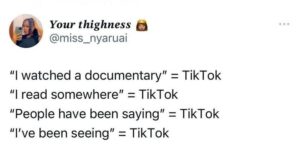“I learnt this from TikTok”…but how legitimate is that?
Very often I hear things like “I saw ___ on TikTok”, “There’s this Instagram video that says ___”, “I watched this Youtube video that said ___”, etc. when it comes to newly discovered information that people are spewing my way. I am guilty of this too. This begs the question though… with anyone and everyone being able to post anything and everything on social media… how do we know what is fact and not?

Don’t get me wrong, having an insane amount of information ready at your fingertips is extremely helpful. My life has been saved many times by Youtube tutorial videos and I am sure yours has too. But not only in our own lives, but in our future classrooms, we need to make sure that this awesome information tool called the internet is approached with a level of skepticism. Students need to learn that everything should be taken with a grain of salt (looking at you Wikipedia) and that they should have the skills to validate the information they have found.
One quote in the video that stood out to me was “(The internet is) about linking people in ways that we’ve never been linked before”. This has been especially true in my life. I met a life-long friend from Germany 7 years ago through online games. I never would have known him if it weren’t for our digital advancements.
Additionally, I ran the Instagram page at my previous workplace and that allowed countless customers to feel more comfortable starting up conversation with me in the store saying things like “It’s the guy from Instagram!”, “Your last post was so funny!” etc. etc.. On the more uncomfortable side of this however is the brief amount of minor fame I had on TikTok in 2020 where 8 of my videos gained 180k to 2 million views. During this time and at both of my workplaces, I was recognized by customers due to my TikTok posts. I learnt quickly that my online presence can be a double edged sword. On one hand it can make my work more successful, but it can also create uncomfortable scenarios and a somewhat breach of privacy.
What I wish I had known as a kid and teenager is that what gets posted…is out there forever. A single post can make someone’s life but it can also break someone’s life and I wish that they would be much more adamant about teaching that in schools.
Hi Mason,
I found your post so intriguing as I am someone who is like “I learned this on TikTok” or “I saw this cool trick on Tiktok”. I think your post holds a-lot of value in reminding individuals not to alway believe everything they see on social media, and I also think it would be very helpful for the viewers of your blog to watch said Tiktoks, if you were able to hyperlink the resources!
Hey Kiera. Normally I have tons of hyperlinks and screenshots in my Learning Project posts opposed to my weekly blog posts but thank you. As for the categories, I will work on that. I initially made my ePortfolio through Google Sites and not Edusites so I am still slowly but surely learning edusites.
Hi Mason
In addition to your very thoughtful reflection on the permanence of the internet that is sometimes difficult to grasp for young people, I totally resonate with your skepticism of online sources generally. I often look for a consensus on forums, for example, when I am trying to solve some problem. And it still may not serve my aims. You’re right that not all hot takes on the TikTok are necessarily created equal. Digital literacy is so important in the classroom, but I was wondering how we equip teachers first with a critical eye to impart to their students? I consider myself a pretty skeptical consumer of media and I still can’t tell you how many times I’ve said those fateful words to my spouse: I just saw on TikTok that this or that is happening in the world… and he’s just like no, that’s not true…. Do we teach students to cross reference everything even when most of us probably don’t…. We should though! It is all about convenience and a dash of sensationalism isn’t it?
Hi Mason,
You’ve raised some important points about the credibility of information we encounter on social media platforms like TikTok, Instagram, and YouTube. It’s true that with the vast amount of content being shared by users, it can be challenging to distinguish fact from fiction.
While these platforms offer valuable resources, it’s crucial to approach them with skepticism and critical thinking skills. Teaching students to validate the information they find online is essential for navigating the digital world responsibly.
Your insight about the permanence of online posts is also significant. Understanding that what gets posted online can have long-lasting consequences is a crucial lesson that should be emphasized more in schools.
Thanks for sharing your thoughts on this important topic!